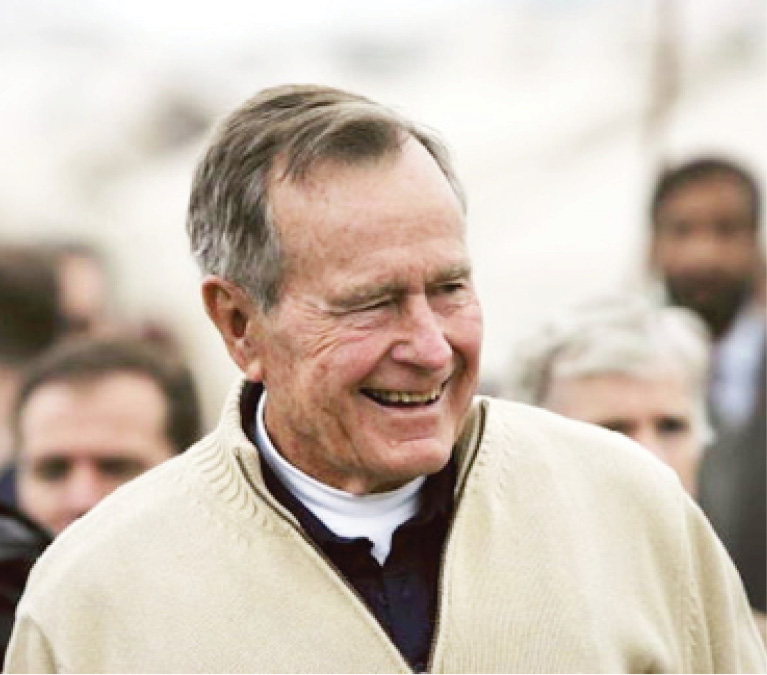World leaders honor late US president George H.W. Bush
Leaders from across the world on Saturday paid tribute to the 41st president of the United States, George H.W. Bush, who died Friday at his home in Houston, Texas at the age of 94. The former president had been in poor health for several years, suffering from a form of Parkinson’s disease and other ailments. […]

George H.W. Bush
Leaders from across the world on Saturday paid tribute to the 41st president of the United States, George H.W. Bush, who died Friday at his home in Houston, Texas at the age of 94.
The former president had been in poor health for several years, suffering from a form of Parkinson’s disease and other ailments.
German Chancellor Angela Merkel’s spokesman said, “We will never forget his contribution to our reunion.”
The late president was an ardent supporter of a unified Germany as well as Western Europe as the Cold War unraveled in the early 1990s.
U.K. Prime Minister Theresa May called Bush “a great statesman and a true friend of our country” whose “ethos of public service was the guiding thread of his life and an example to us all.”
May said in a statement that “in navigating a peaceful end to the Cold War he made the world a safer place for generations to come.
US President Donald Trump said Bush “inspired generations of his fellow Americans to public service.” He added, “Along with his full life of service to country, we will remember former President Bush for his devotion to family – especially the love of his life, Barbara.”
“George H.W. Bush’s life is a testament to the notion that public service is a noble, joyous calling,” said former US President Barack Obama. “And he did tremendous good along the journey.”
Also, a former US President Bill Clinton, who beat Bush in the 1992 election but went on to become good friends with his once-rival, said he “will be forever grateful for the friendship we formed.”
“From the moment I met him as a young governor invited to his home in Kennebunkport, I was struck by the kindness he showed to Chelsea [Clinton’s daughter], by his innate and genuine decency, and by his devotion to Barbara [Bush], his children and their growing brood,” Clinton said.
Former Soviet leader Mikhail Gorbachev said Bush was present at “a time of great change,” adding that his leadership contributed to “the end of the Cold War and nuclear arms race.”
New Zealand Prime Minister Jacinda Ardern said Bush “was a strong supporter of the international rules-based system, the rule of law and democratic values.”
He tried to “create a new international order based on justice and equality among nations,” said Kuwaiti leader Sheikh Sabah Al Ahmad Al Sabah. He never “forgot the Kuwaiti people and will remain in their memory.”
In a life on the world stage and at the highest levels of the American political scene, Bush lost and won elections before becoming the American leader in 1989, and then, with a declining U.S. economy and unemployment rising, was turned out of office after four years in the White House, losing his re-election bid in 1992.
He marked the start of his presidency with a sweeping inaugural declaration that “a new breeze is blowing, and a world refreshed by freedom seems reborn; for in man’s heart, if not in fact, the day of the dictator is over. The totalitarian era is passing, its old ideas blown away like leaves from an ancient, lifeless tree.”
His pronouncement soon proved prophetic, with the fall of the Berlin Wall and the collapse of the Soviet Union occurring early in his presidency. Bush met with Soviet leader Mikhail Gorbachev shortly after the fall of the Berlin Wall, their Malta talks viewed as an important stepping stone toward the two leaders signing the 1991 Strategic Arms Reduction Treaty.
During his four years in the White House, Bush ordered a military operation in Panama to overthrow its drug-trafficking leader, Manuel Noriega. Later, he sent troops to the Mideast to repel Iraqi dictator Saddam Hussein in his attempted takeover of oil-rich Kuwait. It was perhaps the high point of Bush’s presidency, his approval rating among U.S. voters reaching a record 89 percent, with a fireworks display lighting the night-time sky over Washington to salute the successful mission.
Bush’s commitment to his country came early in life. He was a naval fighter pilot in World War II, attacking Japanese targets at the age of 18, victorious in one of the war’s largest air battles, the Battle of the Philippine Sea. Later, he completed one mission after his plane was hit by flak, leaving his engine on fire. He bailed out of the aircraft and was rescued in the waters off the Bonin Islands.
In his rise to the presidency, Bush held a variety of key positions over the years, often deemed by Republican presidents as the most qualified man in U.S. public life. He served as U.S. ambassador to the United Nations in the early 1970s, chairman of the Republican National Committee a short time later, then as chief U.S. envoy to China in the mid-1970s. Later, he was director of the Central Intelligence Agency.
Bush sought the 1980 Republican presidential nomination but lost it to then-California governor, Ronald Reagan, who tapped Bush as his vice presidential running mate in two successful national campaigns, in 1980 and again four years later.
With Reagan barred by the U.S. Constitution from serving more than two terms, Bush plotted a presidential run for 1988, ultimately defeating the Democratic nominee, Massachusetts Gov. Michael Dukakis. (Agency reports)
